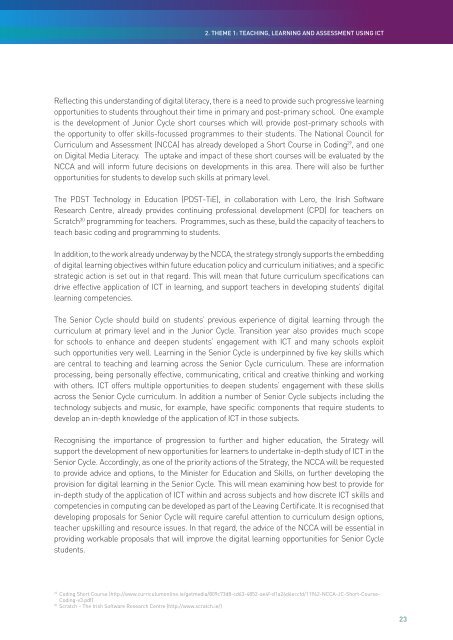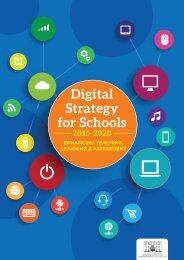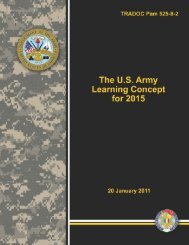Digital Strategy for Schools
TKmc0
TKmc0
Create successful ePaper yourself
Turn your PDF publications into a flip-book with our unique Google optimized e-Paper software.
2. THEME 1: TEACHING, LEARNING AND ASSESSMENT USING ICT<br />
Reflecting this understanding of digital literacy, there is a need to provide such progressive learning<br />
opportunities to students throughout their time in primary and post-primary school. One example<br />
is the development of Junior Cycle short courses which will provide post-primary schools with<br />
the opportunity to offer skills-focussed programmes to their students. The National Council <strong>for</strong><br />
Curriculum and Assessment (NCCA) has already developed a Short Course in Coding 29 , and one<br />
on <strong>Digital</strong> Media Literacy. The uptake and impact of these short courses will be evaluated by the<br />
NCCA and will in<strong>for</strong>m future decisions on developments in this area. There will also be further<br />
opportunities <strong>for</strong> students to develop such skills at primary level.<br />
The PDST Technology in Education (PDST-TiE), in collaboration with Lero, the Irish Software<br />
Research Centre, already provides continuing professional development (CPD) <strong>for</strong> teachers on<br />
Scratch 30 programming <strong>for</strong> teachers. Programmes, such as these, build the capacity of teachers to<br />
teach basic coding and programming to students.<br />
In addition, to the work already underway by the NCCA, the strategy strongly supports the embedding<br />
of digital learning objectives within future education policy and curriculum initiatives; and a specific<br />
strategic action is set out in that regard. This will mean that future curriculum specifications can<br />
drive effective application of ICT in learning, and support teachers in developing students’ digital<br />
learning competencies.<br />
The Senior Cycle should build on students’ previous experience of digital learning through the<br />
curriculum at primary level and in the Junior Cycle. Transition year also provides much scope<br />
<strong>for</strong> schools to enhance and deepen students’ engagement with ICT and many schools exploit<br />
such opportunities very well. Learning in the Senior Cycle is underpinned by five key skills which<br />
are central to teaching and learning across the Senior Cycle curriculum. These are in<strong>for</strong>mation<br />
processing, being personally effective, communicating, critical and creative thinking and working<br />
with others. ICT offers multiple opportunities to deepen students’ engagement with these skills<br />
across the Senior Cycle curriculum. In addition a number of Senior Cycle subjects including the<br />
technology subjects and music, <strong>for</strong> example, have specific components that require students to<br />
develop an in-depth knowledge of the application of ICT in those subjects.<br />
Recognising the importance of progression to further and higher education, the <strong>Strategy</strong> will<br />
support the development of new opportunities <strong>for</strong> learners to undertake in-depth study of ICT in the<br />
Senior Cycle. Accordingly, as one of the priority actions of the <strong>Strategy</strong>, the NCCA will be requested<br />
to provide advice and options, to the Minister <strong>for</strong> Education and Skills, on further developing the<br />
provision <strong>for</strong> digital learning in the Senior Cycle. This will mean examining how best to provide <strong>for</strong><br />
in-depth study of the application of ICT within and across subjects and how discrete ICT skills and<br />
competencies in computing can be developed as part of the Leaving Certificate. It is recognised that<br />
developing proposals <strong>for</strong> Senior Cycle will require careful attention to curriculum design options,<br />
teacher upskilling and resource issues. In that regard, the advice of the NCCA will be essential in<br />
providing workable proposals that will improve the digital learning opportunities <strong>for</strong> Senior Cycle<br />
students.<br />
29<br />
Coding Short Course (http://www.curriculumonline.ie/getmedia/809c73d8-cd63-4852-ae4f-d1a24d4eccfd/11942-NCCA-JC-Short-Course-<br />
Coding-v3.pdf)<br />
30<br />
Scratch – The Irish Software Research Centre (http://www.scratch.ie/)<br />
23




